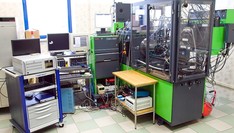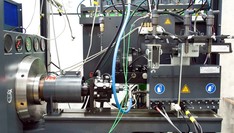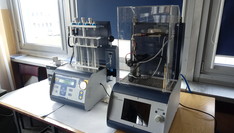The laboratory enables testing and evaluation of various types of injection systems of compression ignition and spark ignition engines. In the field of injection systems for compression-ignition engines, it enables testing of systems:
- Common Rail.
- with in-line injection pumps (up to 12 sections),
- with distributor injection pumps.
The main laboratory equipment is a computerized EPS-815 test station by Bosch, equipped with:
- electronic measuring system for fuel dose KMA ‑ 822,
- CRS-845 module for testing high pressure pumps of Common Rail systems,
- CRI-846 module for testing piezo and electromagnetic injectors.
The station also includes:
- a heat exchanger necessary for testing high-pressure systems,
- equipment for testing in-line injection and distributor pumps,
- a set of test injectors of various types.
The station is monitored by a PC with Bosch EPS945 ‑ PE / VE / CR software. The software of the station enables the control of the test bench and the measuring system according to any test schedule. The test schedule for high pressure pumps in Common Rail (CR) systems can also be read from the supplied database (CD-Testdata) containing the technical data of these pumps. The created test programs and test results can be archived on disks and printed on the printer provided with the stand. The injected fuel doses are displayed in a digital and graphic form. The measured values are shown in various colors enabling quick control of exceeding the permissible tolerance and spread values.
- an external hydraulic system that allows testing of injection equipment with the use of alternative fuels,
- a measuring stand for researching the development of a stream of fuel injected into a constant volume chamber.
In the field of testing petrol injection systems, the laboratory enables the testing and evaluation of injectors in spark ignition engines, both indirect and direct injection systems, including piezoelectric injectors. The following devices are used to test these components:
- device for testing gasoline injectors indirect and direct injection (at low pressure 0-10 bar) type GS4 by Carbon Zapp,
- device for testing gasoline injectors of direct injection under high pressure, type GD1R by Carbon Zapp.
The GS4 device enables testing of injectors of spark ignition engines used in injection systems:
- indirect - single (TBI) and multi-point (MPFI),
- direct in the low pressure range (up to 10 bar).
The device also allows you to test LPG and CNG injectors. In addition to measuring the dose, the device enables the assessment of:
- uneven flow in the injector (contamination),
- the shape of the fuel stream,
- injector leaks or clogging,
- the condition of the injector nozzle springs.
The GD1R device enables the testing of GDI direct gasoline injectors in manual or automatic mode at a working pressure of up to 450 bar. The device can be used to test electromagnetic (coil) or piezoelectric injectors, for which it is possible to revitalize the piezo stack. The device allows for testing the injectors of GDI, FSI, HPI, DISI injection systems from companies such as:
- Bosch,
- Conti / VDO,
- Delphi,
The device can be used to carry out the following examinations and tests:
- RLC - measurement of resistance, inductance of the injector coil and capacity in the case of piezo injectors,
- CFL - external tightness test,
- LKT - static overflow test under high working pressure,
- iVM - Injection dose test:
- full load (FL),
- partial load (PL),
- emission dose (EM),
- idle (LL),
- pre-injection / post-injection (PI),
- RSP - injector response time test,
- SPR - dynamic spray test under overpressure conditions.






